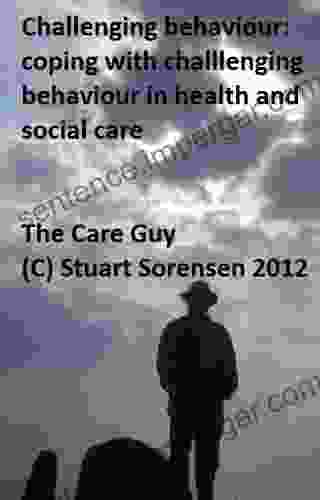Coping With Challenging Behaviour In Health And Social Care: A Comprehensive Guide To Effective Strategies

4.5 out of 5
| Language | : | English |
| File size | : | 163 KB |
| Text-to-Speech | : | Enabled |
| Enhanced typesetting | : | Enabled |
| Word Wise | : | Enabled |
| Print length | : | 43 pages |
| Lending | : | Enabled |
Challenging behaviours are a common occurrence in health and social care settings, posing significant challenges to healthcare professionals and caregivers. These behaviours can range from verbal aggression and resistance to physical violence and self-harm. Managing such behaviours effectively is crucial for ensuring patient and client safety, maintaining a positive work environment, and delivering high-quality care.
This comprehensive guide provides invaluable insights and practical strategies to assist professionals in coping with challenging behaviours in health and social care settings. It explores the various underlying causes and theoretical perspectives of challenging behaviours, equips readers with a range of effective behaviour management techniques, and highlights the importance of person-centered care and therapeutic interventions.
Understanding Challenging Behaviour
Root Causes of Challenging Behaviour
Challenging behaviours often stem from underlying psychological, physiological, or social needs that are unmet or inadequately addressed. Common causes include:
- Mental health conditions, such as dementia, autism spectrum disFree Download, and schizophrenia
- Physical discomfort, pain, or sensory sensitivities
- Communication difficulties, leading to frustration and misinterpretation
- Environmental stressors, such as noise, crowding, or lack of privacy
- Trauma and abuse
Theoretical Perspectives
Various theoretical perspectives offer insights into understanding challenging behaviours. Some key theories include:
- Behavioural Theory: Focuses on the relationship between environmental factors and behaviour, emphasizing the role of reinforcement and consequences in shaping behaviours.
- Cognitive Theory: Examines the role of thoughts, beliefs, and interpretations in shaping behaviours, suggesting that challenging behaviours may result from negative or distorted cognitions.
- Psychodynamic Theory: Explores unconscious motivations and conflicts that may underlie challenging behaviours, often rooted in past experiences and relationships.
- Social Ecological Theory: Recognises the influence of social and environmental factors on behaviour, emphasizing the importance of considering the broader context in understanding challenging behaviours.
Effective Behaviour Management Techniques
Managing challenging behaviours effectively requires a combination of strategies tailored to the individual's needs and circumstances. Here are some widely recognised and effective techniques:
De-escalation Techniques
De-escalation techniques aim to prevent or calm down escalating situations that may lead to violence or aggression. They include:
- Active Listening: Paying undivided attention, demonstrating empathy, and reflecting on the person's feelings
- Validation: Acknowledging and accepting the person's emotions, even if you don't agree with their behaviour
- Set Boundaries: Clearly communicating what behaviours are unacceptable while maintaining a respectful and non-confrontational tone
- Redirection: Suggesting alternative activities or distractions to shift the person's focus away from the source of agitation
Person-Centered Care and Therapeutic Interventions
Person-centered care and therapeutic interventions focus on understanding and addressing the unique needs and experiences of the individual. These approaches include:
- Positive Behavioural Support: Tailoring interventions to promote positive behaviours while reducing challenging ones, involving the person in setting goals and creating behaviour plans.
- Cognitive Behavioural Therapy (CBT): Identifying and changing negative thoughts and behaviours that contribute to challenging behaviours.
- Mindfulness-Based Interventions: Promoting self-awareness and emotional regulation through practices like mindfulness meditation.
Other Essential Considerations
Communication Strategies
Effective communication is crucial in managing challenging behaviours. Key strategies include:
- Use Clear and Concise Language: Avoid jargon and technical terms that may be confusing
- Maintain a Calm and Respectful Tone: Even in challenging situations, avoid raising your voice or using judgmental language
- Listen Actively: Demonstrate that you are genuinely listening by paying attention to both verbal and non-verbal cues
Behaviour Plans
Behaviour plans are structured interventions that outline specific strategies for managing challenging behaviours. They should be developed in collaboration with the individual, their family, and the healthcare team and tailored to their unique needs.
Crisis Management
In cases of severe or imminent danger, crisis management protocols are essential. These include:
- Emergency Response Plans: Establishing clear procedures for responding to violent or aggressive behaviours
- Staff Training: Ensuring that all staff are adequately trained in crisis management techniques and safety protocols
Staff Safety
Protecting staff safety is paramount when dealing with challenging behaviours. Measures include:
- Risk Assessments: Evaluating potential risks and implementing strategies to minimise harm
- Protective Equipment: Providing appropriate personal protective equipment (PPE) when necessary
Effectively coping with challenging behaviours in health and social care settings requires a multi-faceted approach that incorporates understanding the underlying causes, employing evidence-based behaviour management techniques, and prioritising person-centered care. By equipping healthcare professionals and caregivers with the knowledge and skills outlined in this guide, we can improve the quality of life for those with challenging behaviours, promote safety in healthcare environments, and enhance the overall delivery of health and social care services.
Remember, every individual is unique, and what works for one person may not work for another. It is essential to approach each situation with empathy, compassion, and a willingness to adapt and individualise interventions to meet the specific needs of the person you are caring for.
4.5 out of 5
| Language | : | English |
| File size | : | 163 KB |
| Text-to-Speech | : | Enabled |
| Enhanced typesetting | : | Enabled |
| Word Wise | : | Enabled |
| Print length | : | 43 pages |
| Lending | : | Enabled |
Do you want to contribute by writing guest posts on this blog?
Please contact us and send us a resume of previous articles that you have written.
 Book
Book Novel
Novel Page
Page Chapter
Chapter Text
Text Story
Story Genre
Genre Reader
Reader Library
Library Paperback
Paperback E-book
E-book Magazine
Magazine Newspaper
Newspaper Paragraph
Paragraph Sentence
Sentence Bookmark
Bookmark Shelf
Shelf Glossary
Glossary Bibliography
Bibliography Foreword
Foreword Preface
Preface Synopsis
Synopsis Annotation
Annotation Footnote
Footnote Manuscript
Manuscript Scroll
Scroll Codex
Codex Tome
Tome Bestseller
Bestseller Classics
Classics Library card
Library card Narrative
Narrative Biography
Biography Autobiography
Autobiography Memoir
Memoir Reference
Reference Encyclopedia
Encyclopedia James W Williams
James W Williams James E Perone
James E Perone Jean Claude Tedenac
Jean Claude Tedenac Jane Seabrook
Jane Seabrook James R Barrante
James R Barrante Jeanne Murray Walker
Jeanne Murray Walker Jean Lipman Blumen
Jean Lipman Blumen Jeff Deck
Jeff Deck Jan Faye
Jan Faye Janet Mancini Billson
Janet Mancini Billson James Williams
James Williams James M Kouzes
James M Kouzes Jane Thompson
Jane Thompson James M Dennis
James M Dennis James Desborough
James Desborough James Willard Schultz
James Willard Schultz Janice Irwin
Janice Irwin Jannette Tomamao
Jannette Tomamao Jean Pierre Rossouw
Jean Pierre Rossouw James Duffy
James Duffy
Light bulbAdvertise smarter! Our strategic ad space ensures maximum exposure. Reserve your spot today!

 W.B. YeatsUnveiling the Literary Masterpiece: Chambers Edinburgh Journal No 421 Volume...
W.B. YeatsUnveiling the Literary Masterpiece: Chambers Edinburgh Journal No 421 Volume...
 Langston Hughes100 Useful Tricks That Will Make Your Life Easier: Mobile Phone, Travel, and...
Langston Hughes100 Useful Tricks That Will Make Your Life Easier: Mobile Phone, Travel, and...
 Haruki MurakamiAn Overview of Olympic Athletics: A Captivating Journey into the Sporting...
Haruki MurakamiAn Overview of Olympic Athletics: A Captivating Journey into the Sporting... Owen SimmonsFollow ·2.2k
Owen SimmonsFollow ·2.2k VoltaireFollow ·6.3k
VoltaireFollow ·6.3k Steven HayesFollow ·6k
Steven HayesFollow ·6k Julio CortázarFollow ·7.5k
Julio CortázarFollow ·7.5k Guillermo BlairFollow ·13.3k
Guillermo BlairFollow ·13.3k Ted SimmonsFollow ·15.3k
Ted SimmonsFollow ·15.3k Earl WilliamsFollow ·18.7k
Earl WilliamsFollow ·18.7k Nikolai GogolFollow ·12.1k
Nikolai GogolFollow ·12.1k

 Jacob Foster
Jacob FosterPrinciples and Persons: The Legacy of Derek Parfit
Derek Parfit's 1984 book,...

 Leo Mitchell
Leo MitchellPartners For Life: Raise Support For Your Missionary Work...
Are you a missionary or ministry leader...

 Blake Kennedy
Blake KennedyOn Desperate Ground: A Gripping Account of World War II's...
Hampton Sides' "On...

 Duane Kelly
Duane KellyCriminal Minds Sociopaths Serial Killers And Other...
In the realm of criminology,...

 Craig Blair
Craig BlairHome Repair: The Ultimate Guide to Fix, Maintain, and...
Welcome to the...

 Elmer Powell
Elmer PowellThe Organic Grower Guide to Mycorrhizae Science for...
Unlock the Secrets of Soil...
4.5 out of 5
| Language | : | English |
| File size | : | 163 KB |
| Text-to-Speech | : | Enabled |
| Enhanced typesetting | : | Enabled |
| Word Wise | : | Enabled |
| Print length | : | 43 pages |
| Lending | : | Enabled |





